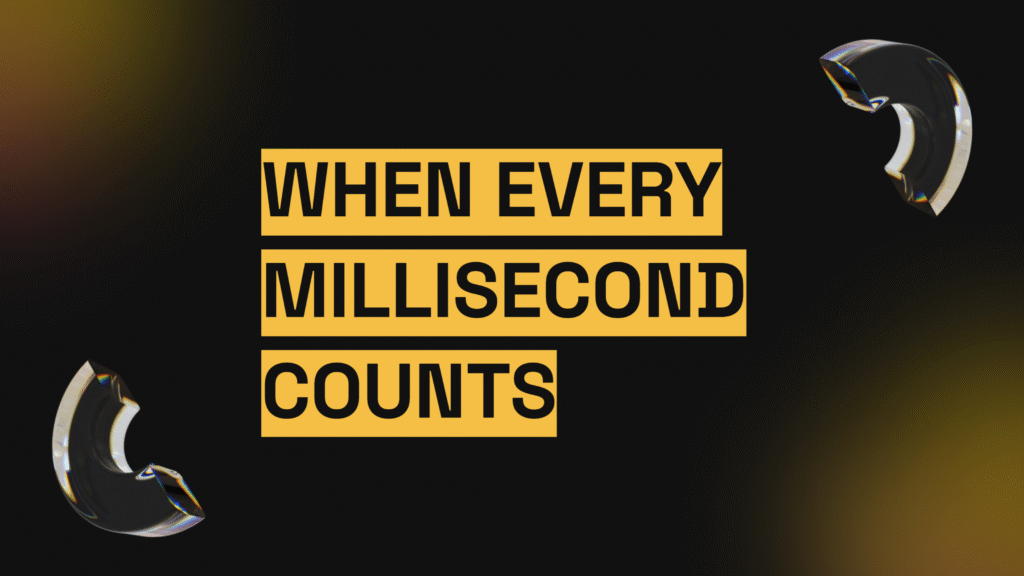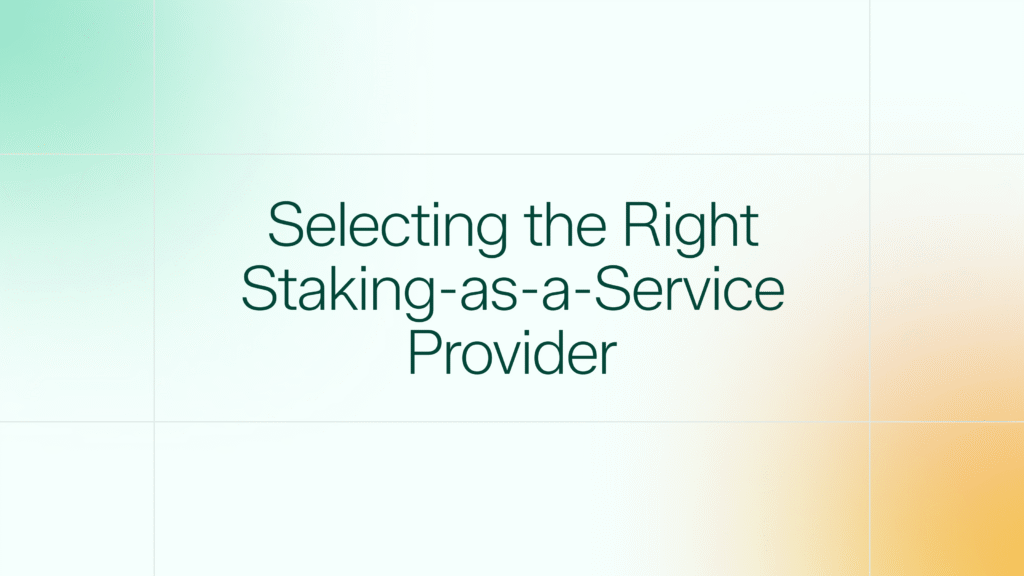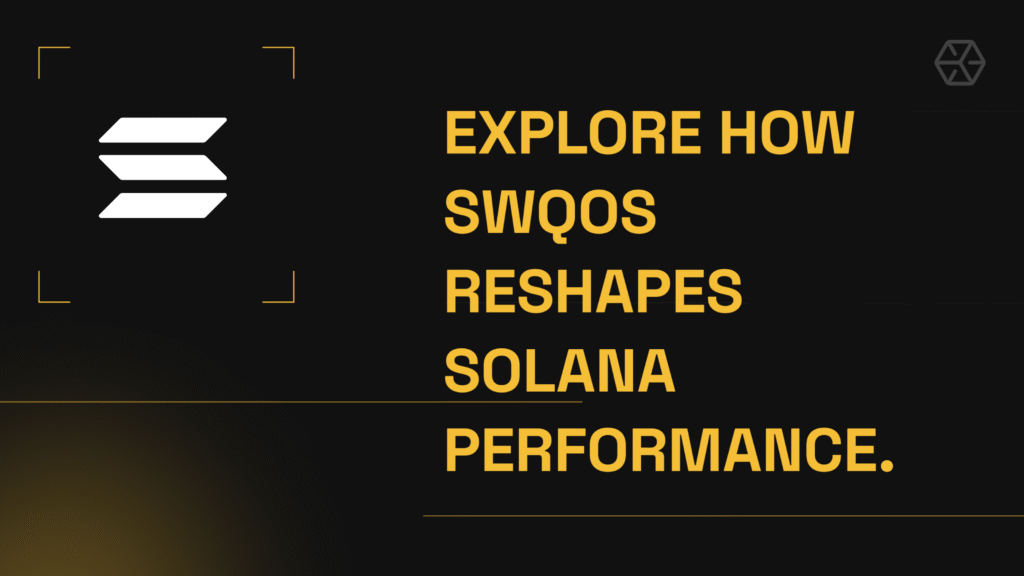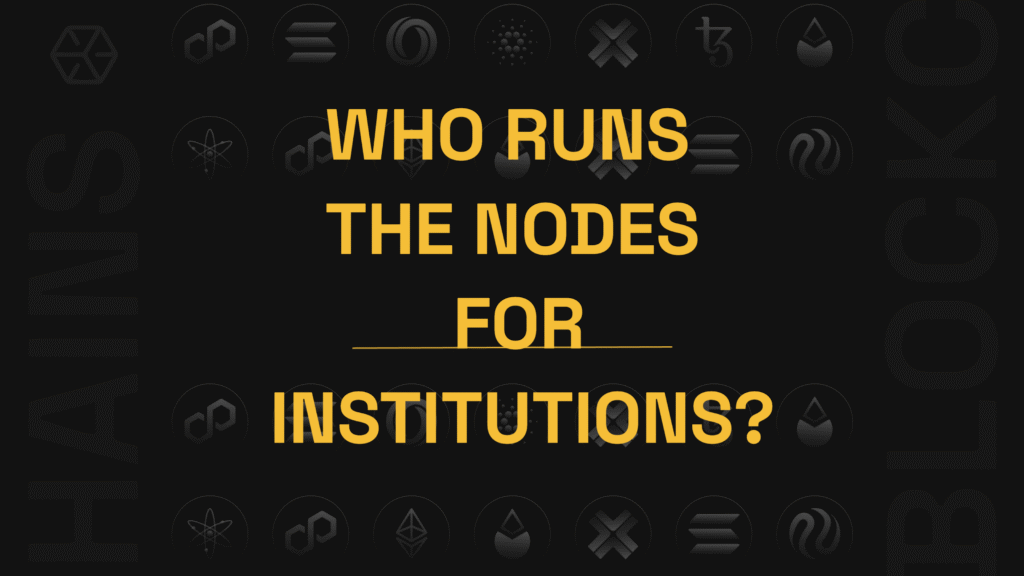
web3 infrastructure
Solana ShredStream: Ultra-Low Latency Data for Institutions
In Solana high-frequency trading, DeFi, or institutional validation, information latency’s importance is paramount, which makes access to raw shreds in real time essential. Everstake’s Solana ShredStream delivers exactly what is expected by high-stakes traders or institutions: ultra-low latency and enterprise-grade data services designed to power sophisticated use cases. This article explains Solana ShredStream, how Everstake...
SEP 25, 2025
Table of Contents
What Is Solana ShredStream?
Why Real-Time Shreds Matter: Use Cases and Benefits
How Everstake ShredStream Works
When to Use Everstake ShredStream vs Traditional RPC
Key Benefits of Everstake ShredStream
Pricing & Plans
ShredStream: Everstake vs Alternatives
Technical Notes on Communication Protocols
Why Everstake
FAQ: Solana ShredStream Explained
Conclusion
Share with your network
In Solana high-frequency trading, DeFi, or institutional validation, information latency’s importance is paramount, which makes access to raw shreds in real time essential. Everstake’s Solana ShredStream delivers exactly what is expected by high-stakes traders or institutions: ultra-low latency and enterprise-grade data services designed to power sophisticated use cases.
This article explains Solana ShredStream, how Everstake implements it, its benefits, pricing, and how it compares to other providers.
What Is Solana ShredStream?
Solana ShredStream refers to streaming raw Solana shreds directly from network leaders and validator sources, rather than relying purely on processed block or transaction feeds (RPC, WebSockets, etc.). Interface to raw shreds allows you to see fragments of blocks (shreds) as they are produced, enabling earlier visibility into on-chain state, faster detection of events, and quicker transaction opportunities.
Solana’s Shreds Explained
Each Solana block consists of two main types of shreds:
- Data shreds, carrying the core transaction content.
- Coding shreds and redundancy fragments are generated through Reed–Solomon erasure coding to protect against data loss or delays.
This fragmentation and parallel propagation enable Solana to reach momentous throughput and low latency, with blocks produced every ~400–500 milliseconds.
Shreds are transmitted through a stake-weighted Turbine network topology: validators with higher stake receive the shreds faster, allowing for earlier voting and block processing. This mechanism provides the technical foundation for ultra-low latency applications like ShredStream.
Why Real-Time Shreds Matter for Speed and Resilience
Seeing transaction data before it’s fully processed or confirmed gives competitive edges useful in high-frequency trading, MEV searchers, liquidation bots, or any strategy dependent on reacting first. Delays of even tens or hundreds of milliseconds matter.
Direct shred streams offer paths that bypass slower hops of Turbine, reduce dependency on RPC node queues, and add failover sources. Entities in remote or less well-peered regions can suffer under public RPC setups; real-time shred delivery mitigates that.
For validators, using raw shreds can improve block processing timing. For RPC services and analytics tools, raw shreds enable finer control over data correctness, ordering, and event detectability.
Why Real-Time Shreds Matter: Use Cases and Benefits
Case 1: Competitive Edge in High-Frequency Trading
The difference of just 100 to 400 milliseconds saved compared to standard RPC feeds can drastically change the outcome of time-sensitive trading strategies. ShredStream enables trading bots to:
- Detect price discrepancies and arbitrage opportunities faster.
- React quicker to liquidation events.
- Submit transactions ahead of competitors.
Case 2: Validator Performance Enhancements
For validators, especially those with significant stake, early shred access:
- Enables faster block propagation.
- Improves vote timing, increasing chances to secure rewards.
- Improves uptime and stability, particularly in congested or remote networks.
Case 3: Optimized RPC Infrastructure
RPC node operators can use ShredStream to seed their nodes directly with raw data, reducing queueing delays and improving throughput during network load spikes.
Case 4: Real-Time DeFi Analytics
Developers and protocols benefit from:
- Faster alerts for state changes.
- More granular and timely dashboards.
- Earlier detection of critical events than offered by traditional RPC.
How Everstake ShredStream Works
Everstake has designed our ShredStream to meet the needs of institutions that require consistent ultra-low latency, high availability, and enterprise-grade infrastructure.
- Direct delivery of raw Solana shreds
Everstake connects to Solana leaders to retrieve raw shreds in near-real time. Rather than waiting for processed blocks or relying on public RPC endpoints, clients get the fragments as soon as they emerge. - Millisecond execution
Everstake ShredStream saves hundreds of milliseconds compared to standard data feeds, which is crucial in speed-sensitive use cases. - Global redundant infrastructure
The service is available in multiple geographies. Even the basic Connect plan covers endpoints in Amsterdam and Frankfurt. Higher plans include more global endpoints (e.g., Tokyo, New York) for better regional proximity. Infrastructure is redundant to avoid single points of failure. - SLA-backed reliability
Everstake offers enterprise support, 24/7 reliability, and infrastructure built to enterprise certification levels. Uptime is guaranteed in service level agreements.
When to Use Everstake ShredStream vs Traditional RPC
When ShredStream Is Essential
- If your application needs millisecond-level reaction times, such as algorithmic or high-frequency trading.
- If you operate Solana validators that must propagate blocks and vote faster for maximum rewards.
- For specialized DeFi analytics requiring immediate data visibility.
- When network conditions limit RPC node reliability or latency.
- If optimizing RPC infrastructure throughput and reducing bottlenecks is a priority.
When Traditional RPC Suffices
- If your application can tolerate delays in the hundreds of milliseconds (e.g., wallets, explorers).
- If simplicity and out-of-the-box tooling integration are more important than absolute speed.
- If your use case does not require visibility prior to block finalization.
Quantifying Latency Savings: A Formulaic Approach
Latency savings from ShredStream can be expressed as:

Where:
- tRPC—total delay of processed data via RPC, averaging ~400 ms due to block production and propagation.
- tShreadStream—delay providing raw shreds, often ranging between 10–50 ms depending on geographic proximity and network infrastructure.
In practice, Everstake clients report latency improvements between 100 and 400+ milliseconds, crucial in the time-sensitive Solana ecosystem.
Key Benefits of Everstake ShredStream
Institutional customers and professional traders can enjoy several fundamental benefits of Everstake ShredStream.
- High-frequency trading execution
With raw shreds, trading systems can detect on-chain events earlier and submit transactions ahead of others. With lower latency, detecting a price discrepancy, a liquidation event, or a large swap becomes possible. - Validator uptime & stability boost
For validators, especially those staked, early access to shreds allows for faster propagation, quicker vote timing, and better performance overall, especially in less connected regions or under high load. - Solana RPC infrastructure optimization
RPC providers can use ShredStream to seed their nodes with raw data, improving their transaction/block subscription services, reducing lag, reducing queue delays, and improving throughput under congestion. - Real-time analytics for DeFi protocols
Protocols monitoring user behavior, account changes, price feeds, or oracles benefit from earlier state change detection. Real-time shreds allow analytics systems to see things before traditional RPCs, improving dashboards, risk monitoring, and alerting.
Pricing & Plans
Everstake offers tiered plans tailored to different levels of latency, global coverage, and throughput, with plans starting at $199/month.
| Plan | Monthly Price |
| ShredStream Connect — $199/month | Basic entry-level access. Includes ~1 Gbps throughput, endpoints in Amsterdam and Frankfurt, and a shred endpoint with one IP whitelist. A good option for smaller operations that need reliable Solana low-latency data. |
| ShredStream Pro — $499/month | Extended features include more global endpoints (e.g., Tokyo, New York), increased whitelist IPs, block-transaction filters, HTTP stream, and dedicated host. This is for users who require more performance and global consistency. |
| Custom Enterprise — on request | For very large or specialized use cases: custom throughput, routing, geographic coverage, SLAs, dedicated support, possibly bespoke deployments. Price depends on scale. |
All plans include enterprise-grade infrastructure, support, and reliability guarantees.
ShredStream: Everstake vs Alternatives
Everstake ShredStream stacks up against two of its closest competitors in ShredStream Solana: Jito ShredStream and Helius ShredStream (also known as Helius Shred Delivery / LaserStream). The comparison below is based on publicly available data as of the latest updates at the time of writing.
| Criterion | Everstake ShredStream | Jito ShredStream | Helius ShredStream / Shred Delivery / LaserStream |
| Latency | Very low: Everstake claims it can save hundreds of milliseconds over public RPC feeds via raw shreds. Near-real-time, especially for clients close to Everstake’s endpoints. | Also very low: Jito’s documentation emphasizes lowest latency shreds from leaders, with savings of hundreds of milliseconds. | Helius offers “Shred Delivery” (raw shreds) and “LaserStream” (optimised streaming) with globally distributed endpoints and stake priority in Turbine. Exact latency numbers are less public. |
| Global Coverage | Connect plan includes Europe (Amsterdam, Frankfurt), while Pro adds Asia (Tokyo) and the US (New York), etc. | Jito’s ShredStream has regional options, but often via partners or proxies. Users may need to deploy proxies or use dedicated nodes in multiple regions to get full global coverage. | Helius provides endpoints in many regions (e.g. Amsterdam, Frankfurt, Tokyo, Singapore, Newark, Pittsburgh, Salt Lake City) for LaserStream. Also Shred Delivery via direct raw shreds globally. |
| Uptime / Reliability | Enterprise SLA, redundant infrastructure, pro-grade uptime. Everstake ShredStream is enterprise-ready. | Jito’s offering is stable but may depend on the proxy’s proximity, network path, etc. Public data on SLA is less explicit. | Helius emphasizes multi-node redundancy, automatic failover, historical replay so missed data can be backfilled. SLA aspects are available only for premium plans. |
| Security & Compliance | Everstake claims enterprise certifications (SOC2 / ISO27001) in its validator/infrastructure services. | Compliance and enterprise-grade certification are not as prominently published. | Public messaging does not always emphasize formal certifications at the same level or detail as Everstake. |
| Enterprise Support | 24/7 support, SLA backed, custom plans, IP whitelisting, dedicated host options. Everstake sells ShredStream to institutional clients. | Jito offers documentation and proxy tools, but the public materials do not clearly state enterprise-grade onboarding and SLA terms. | Helius includes dedicated support in its paid plans (Business, Professional, etc.), with custom configurations, white-glove provisioning especially for the Shred Delivery Beta product. |
| Pricing Transparency | Full pricing for Connect ($199/mo), Pro ($499/mo), with plan features clearly published. Custom enterprise pricing on request. | Jito ShredStream is offered via partners like RPCFast. Some pricing is bundled (e.g., free add-on for dedicated node clients) rather than always separately quoted, and exact costs may require contact. | Helius publishes many pricing tiers (LaserStream, etc.), though Beta Shred Delivery may have terms that are by application. Some add-ons (e.g., data allowances) have published overage fees. |
Everstake is the only provider combining SLA-backed latency with SOC 2-certified infrastructure and transparent pricing.
Technical Notes on Communication Protocols
Everstake provides ShredStream data via:
- TCP/gRPC: Reliable, ordered delivery, minor latency overhead.
- UDP forwarding: Emerging low-latency option trading speed prioritized over reliability, popular among algorithmic traders.
Low-latency UDP streams bypass TCP connection overhead but can suffer occasional packet loss; ideal for speed-critical use cases.
Why Everstake
Everstake presents several strengths that make it a compelling choice for institutions considering Solana high-frequency trading, Solana low-latency data access, or upgrading Solana RPC infrastructure.
- $7B+ staked, 40,000+ nodes worldwide
Everstake’s scale indicates both technical capacity and stability, as well as profound experience in network operations and trust from a large set of partners. - SOC 2 Type II, ISO27001:2022, GDPR, NIST CSF, ITGC, GDPR, and CCPA certified infrastructure
Certifications and compliance of Everstake and its services are a matter of public record. - Deep Solana validator expertise
Everstake has run validators for years, with a track record of node ops, uptime, staking, and validator services. Their experience helps in handling edge cases, optimizing routes, and dealing with network changes. - Integrated with SWQoS and Institutional Staking
We also offer additional services like Stake-Weighted Quality of Service (RPC priority lanes) and Validator-as-a-Service (VaaS). Thus, customers can receive data earlier, improving their transaction inclusion, routing, and operational simplicity.
FAQ: Solana ShredStream Explained
What is a shred in Solana?
A shred is a smaller fragment of a Solana block: data and coding shreds are used to split up transaction data and redundancy data so that blocks can be propagated in parallel across the network, reconstructed even if some pieces are delayed or dropped, and propagated with high throughput and fault tolerance.
How is ShredStream different from RPC?
Traditional RPC (HTTP/JSON, WebSockets, or gRPC services without special shred-ing) typically deliver data after blocks are processed, committed, or at least propagated across many network layers. ShredStream provides earlier visibility by tapping into raw shreds from leaders or early propagation layers. It means you see fragments of blocks earlier, enabling faster detection of transactions or state changes. ShredStream requires handling raw data, deshredding, decoding, etc., which adds complexity.
How fast is it compared to public data feeds?
While exact numbers depend on your location, network setup, and provider endpoints, providers like Everstake and Jito claim hundreds of milliseconds of savings over public RPC feeds. Helius describes LaserStream or Shred Delivery as “earliest possible access”, with stake priority and raw shreds giving advantage over standard commitment-based RPC/websocket feeds.
How can I get started with Everstake ShredStream?
- Review the plans (Connect, Pro, Enterprise) to understand which fits your architecture, latency budget, and geographic needs.
- Choose endpoint region(s) close to your servers to reduce network latency.
- Whitelist your IPs (Everstake requires this for endpoints) as part of setup.
- Integrate via the Shred endpoint + HTTP stream (or other streaming interface Everstake provides).
- Possibly build or use existing logic to process raw shreds: deshredding, ordering, decoding, etc., depending on how much of the data you need in raw vs processed form.
Conclusion
For institutions, market makers, trading desks, or protocols that rely on low latency, deterministic Solana transactions and need enterprise-grade Solana infra, Everstake’s ShredStream offers a strong, transparent, and capable solution. It combines raw shred access, global redundancy, SLA-backed reliability, and clear pricing with complementary services like SWQoS and Validator-as-a-Service to round out the infrastructure stack.
Book a demo today to see how ShredStream can integrate into your infrastructure or use case.
***
Everstake is a software platform that provides infrastructure tools and resources for users but does not offer investment advice or investment opportunities, manage funds, facilitate collective investment schemes, provide financial services, or take custody of, or otherwise hold or manage, customer assets. Everstake does not conduct any independent diligence on or substantive review of any blockchain asset, digital currency, cryptocurrency, or associated funds. Everstake’s provision of technology services allowing a user to stake digital assets is not an endorsement or a recommendation of any digital assets by it. Users are fully and solely responsible for evaluating whether to stake digital assets.
Share with your network
Related Articles

The ABCs of Crypto
web3 infrastructure
Enterprise Staking-as-a-Service: Secure, Non-Custodial Infrastructure for Institutions
Institutional Staking-as-a-Service is a non-custodial infrastructure solution that allows organizations to participate in Proof-of-Stake (PoS) consensus and earn protocol-native rewards while offloading the technical burden of validator management.
FEB 26, 2026

web3 infrastructure
SWQoS (Stake-Weighted QoS): A New Standard for Solana RPC Access
Public RPCs aren’t built for institutional scale. Learn how the best Stake-Weighted QoS transforms Solana into a network where performance is guaranteed, not assumed.
OCT 11, 2025

web3 infrastructure
Best Validator-as-a-Service (VaaS) Providers for Institutions
Institutions are turning to validator-as-a-service. But which providers truly deliver on uptime, security, and compliance?
SEP 16, 2025
Disclaimer
Everstake, Inc. or any of its affiliates is a software platform that provides infrastructure tools and resources for users but does not offer investment advice or investment opportunities, manage funds, facilitate collective investment schemes, provide financial services or take custody of, or otherwise hold or manage, customer assets. Everstake, Inc. or any of its affiliates does not conduct any independent diligence on or substantive review of any blockchain asset, digital currency, cryptocurrency or associated funds. Everstake, Inc. or any of its affiliates’s provision of technology services allowing a user to stake digital assets is not an endorsement or a recommendation of any digital assets by it. Users are fully and solely responsible for evaluating whether to stake digital assets.
Sign Up for
Our Newsletter
By submitting this form, you are acknowledging that you have read and agree to our Privacy Notice, which details how we collect and use your information.